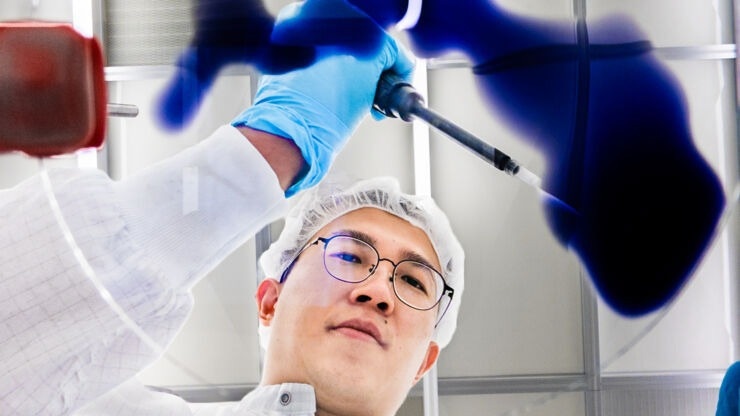Researchers at Linköping University have devised a more environmentally friendly method for producing conductive inks, a crucial component in organic electronics used for applications like solar cells, artificial neurons, and soft sensors. The results, detailed in Nature Communications, open the door to future sustainable technologies.
 Tiefeng Liu, postdoc at the Laboratory of Organic Electronics, is one of the researchers behind the new conductive ink that may pave the way for future sustainable technologies. Image Credit: Thor Balkhed
Tiefeng Liu, postdoc at the Laboratory of Organic Electronics, is one of the researchers behind the new conductive ink that may pave the way for future sustainable technologies. Image Credit: Thor Balkhed
Organic electronics are gaining prominence as a substitute for traditional silicon-based electronics. With advantages like easy manufacturing, high flexibility, low weight, and electrical properties akin to conventional semiconductors, organic electronics find utility in various applications such as digital displays, energy storage, solar cells, sensors, and soft implants.
Organic electronics are constructed using semiconducting plastics, referred to as conjugated polymers. Nevertheless, processing these conjugated polymers often involves using environmentally hazardous, toxic, and flammable solvents. This poses a significant hindrance to the broad commercial and sustainable utilization of organic electronics.
Highly Conductive
Researchers at Linköping University have introduced a novel, sustainable method for processing these polymers using water. Beyond its environmental friendliness, this new approach results in highly conductive inks.
Our research introduces a new approach to processing conjugated polymers using benign solvents such as water. With this method, called ground-state electron transfer, we not only get around the problem of using hazardous chemicals, but we can also demonstrate improvements in material properties and device performance.
Simone Fabiano, Senior Associate Professor, Laboratory of Organic Electronics, Linköping University
Sustainable Electronics
In testing the new conductive ink as a transport layer in organic solar cells, researchers observed higher stability and efficiency than traditional materials. Additionally, the ink was tested for creating electrochemical transistors and artificial neurons, showcasing operating frequencies akin to biological neurons.
I believe that these results can have a transformative impact on the field of organic electronics. By enabling the processing of organic semiconductors from green and sustainable solvents like water, we can mass-produce electronic devices with minimal impact on the environment.
Simone Fabiano, Senior Associate Professor, Laboratory of Organic Electronics, Linköping University
Simone Fabiano is a Wallenberg Academy Fellow.
The study was supported by the Knut and Alice Wallenberg Foundation, the Wallenberg Initiative Materials Science for Sustainability (WISE), the Wallenberg Wood Science Centre (WWSC), the Swedish Research Council, Vinnova, the European Commission, and the Swedish government’s strategic investment in new functional materials (AFM) at Linköping University.
Journal Reference:
Liu, T., et al. (2023). Ground-state electron transfer in all-polymer donor:acceptor blends enables aqueous processing of water-insoluble conjugated polymers. Nature Communications. doi.org/10.1038/s41467-023-44153-7
Source: https://liu.se/en